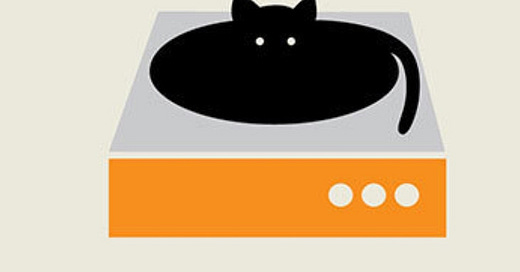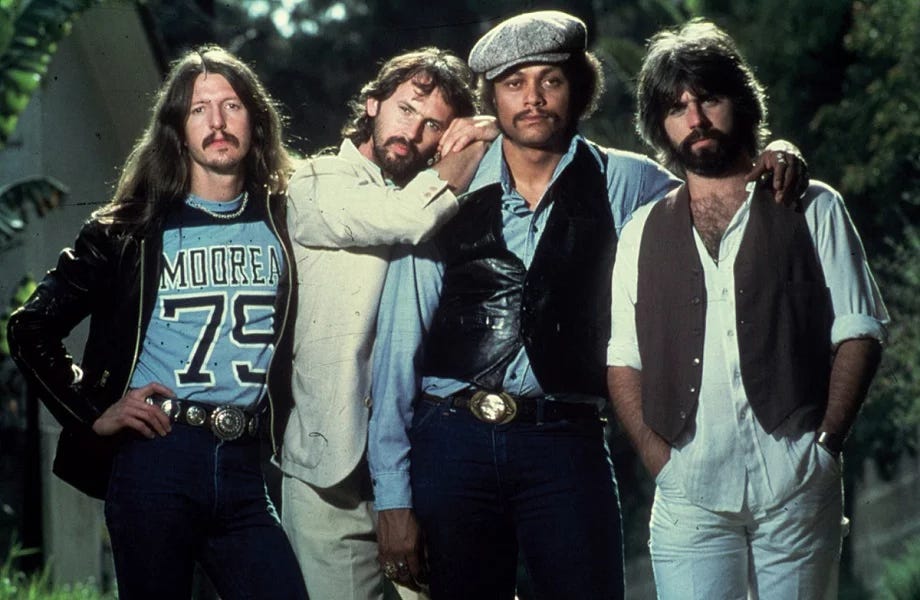The administration at my place of employment is always encouraging the faculty to adopt AI into our curriculum. Given that I work at a university, it feels like they are asking us to figure out ways of getting ourselves fired, but I usually try, within reason, to obey my overlords, so sometimes I assign a paper in which students have to write about one use of AI that is making their life demonstrably worse. Recently, one of my students, Victor, chose the topic of music. He argued that AI-made music is trash and that AI d-jays are bad at their jobs.
Now, although he has a mustache and is in college, I happen to know that Victor is only 17 years old. I know this because, back in the Before Times a few weeks ago, he said he was upset because he couldn’t vote yet. Victor never takes off his goddamn headphones in class, and I don’t know what he listens to, or how, when you’re only 17, you already know that AI d-jays are bad. But the fact that DOES know shows me that there are some serious leaks in the system.
For people my age, of course, the fact that the algorithmic d-jay who serves us on our streaming sites is terrible at their job is a no-brainer. I imagine the people who invented them thought they’d be like your daemon in “The Golden Compass,” expressing your every whim, but in fact, they are just idiots. And actually, that’s wrong. There are no “THEYS” here, it is just a string of code with nothing to go by except that you clicked on some other similarly-chorded tune recently. And hey, maybe you did it for a weird reason, like curiosity, or gossip, or your brother told you to or something.
Anyway, my personal string of code is always suggesting I listen to songs by artists that I hate to hear because I had some shitty interaction with them back in the day, and that is only one reason to hate a song, and not even the best. “I hate this song because that guy grabbed my ass once” is a weak excuse compared to, say, “I hate that song because I heard it on the day I got dumped/my dad died/election day”, and that’s the thing AI will never be able to know about our personal taste in music.
Of course, neither can real d-jays know that stuff, but it’s different somehow. It just feels different to hate a song when it arrives in your ears on accident, from when it arrives in your speakers because it was supposedly chosen just for you. “If you like this, you must like that!” is the AI d-jay’s mantra, and that just isn’t how the human brain works. The human brain likes to interact with other human brains. And in music, that requires a d-jay.
Poor Victor doesn’t know a world where the radio was always on, but I do, and lately I’ve been re-experiencing it via the station KEXP. KEXP is based in Seattle and was originally the University of Washing college station, but it showed up in the Bay Area in October of last year, on a regular FM band slot, 92.3. It took me a little time to get back in the groove to listening to the radio to be honest; I had been listening to my own playlists and podcasts and sometime NPR. But now I am on a newscleanse for the rest of my life; KEXP has stepped up to the plate to fill the void, and it’s been truly remarkable to remember just how much better a humanoid-programmed listening experience is comparatively-speaking.
It is, I will admit, hard to explain why. I think it is because listening to music is such a very human experience that it activates some place in our brain that isn’t all about just liking the song. Maybe I am weird, but for me, it includes the part of my brain that hates things. For example, the other day the KEXP d-jay played a song that I loathe, “Black Water” by the Doobie Brothers. I don’t not like it because I lost a pet that day, or because the Doobie Brothers were considered naff by music snobs back then (though they were). I loathe it because it is an objectively bad song, and they are an objectively bad band, as their dopey name indicates (LOL, see what I did there?) It made me chuckle to think that the youthful KEXP d-jay couldn’t see that right off, but that alone made me think about the d-jay, and their whole trip – what on earth made them put on that song? Why would they think it was OK? Even that is different than when it’s an algorithm, then you don’t have anything to wonder about. You can just skip ahead.
When you listen to radio, you can’t skip ahead, so I continued to listen, and analyzed my hatred of it, which I think can be summed up in the line, “I ain’t got no worries/cos I ain’t in no hurry at all.” Puh- leez! Does this mean they DO have worries and ARE in a hurry? Because if so, shouldn’t they have just said that?
Of course, mere dumb lyrics aren’t enough to really make a song wholly bad, there are plenty of good songs with terrible lyrics. The only thing that really dunks one is personal experience with it. So I put my thinking cap on, and eventually I was able to recall hearing “Black Water” ad infinitum on the way to and from a swim meet at De Anza College in Cupertino in the middle of the 1970s. It was raining, and I swam poorly, and that is all I can tell you about that. I was, what, 11?
But here’s the thing. Even when they play songs I don’t like – and maybe especially when they do that -- I love listening to the radio. I love the surprises and the shoutouts and the weather report, even when it’s for Seattle. I love the d-jays evincing actual personalities and showing off their bizarre taste, and the nagging sense, left over from childhood, that there are little tiny people inside the radio who are making it all happen. It was a pleasure of my youth and now I am experiencing it again. The arrival of KEXP in Oakland has felt like a secret handshake or something, a sign that the robot army isn’t in entirely in control of us.
Yet.







If you're near a phone or computer, you would very likely enjoy the WFMU morning show, Wake'n'Bake. It's like a Bizarro world vision of the old Morning Zoo format that somehow turns out good.
Hi Gina,
I enjoy discussing songs immensely, but I don't want to impose. I'll make this brief defense of "Black Water" and fade into the background.
The Doobie Brothers are an artifact of my happy-go-lucky youth. I know a lot of their songs. Over the past twenty years I've eliminated about half of their songs I initially chose for my curated collection. Your comments about "Black Water" inspired me to listen to it for the first time in years. I agree the lyrics are not great. It would've helped if they had made a one-word substitution and sang "I ain't got no worries and I ain't in no hurry at all."
Otherwise, for the purpose of my collection it has much to recommend. It has a rather distinctive timbre, unlike any other major hit song. Songwriter Patrick Simmons built the song around dueling finger-style acoustic guitar parts in double drop-D tuning, with a viola as the primary lead instrument. It was originally the B-side of a single that was eventually flipped over and slowly made its way to being the Billboard No. 1 song in the country, probably one of the last B-sides (Gloria Gaynor's "I Will Survive" came after) to do so. The chord progression features a cool chord substitution known as a borrowed chord (a B flat chord in the key of D) that gives the "Mississippi moon won't you keep on shining on me." lyric a subtle boost. As a matter of song craft, the melody of "Black Water" flows through the verse to the elaborate chorus seamlessly. Finally, it has a most unusual ending, an A capella breakdown different than the previous parts, one in which three young men in 1975 once spontaneously broke out in song, an act never to be repeated, which greatly impressed their two platonic female friends. It's a moderately sophisticated pop song, and one of the Doobie Brothers' best.
After listening to "Black Water" this week, it does sound a bit sterile to me and I'm going to knock it down a peg. Another famous song by the band will likely get the hook.
Finally, I recently had the subjective versus objective argument with friends discussing the merits of another art form. As usual, I took the objectivity side of the argument and was soundly checkmated. I decided once and for all that I was wrong. As hard as one may try, musical preference is purely subjective. There is no objectivity, only intersubjective agreement built around an agreed-upon framework for analysis.